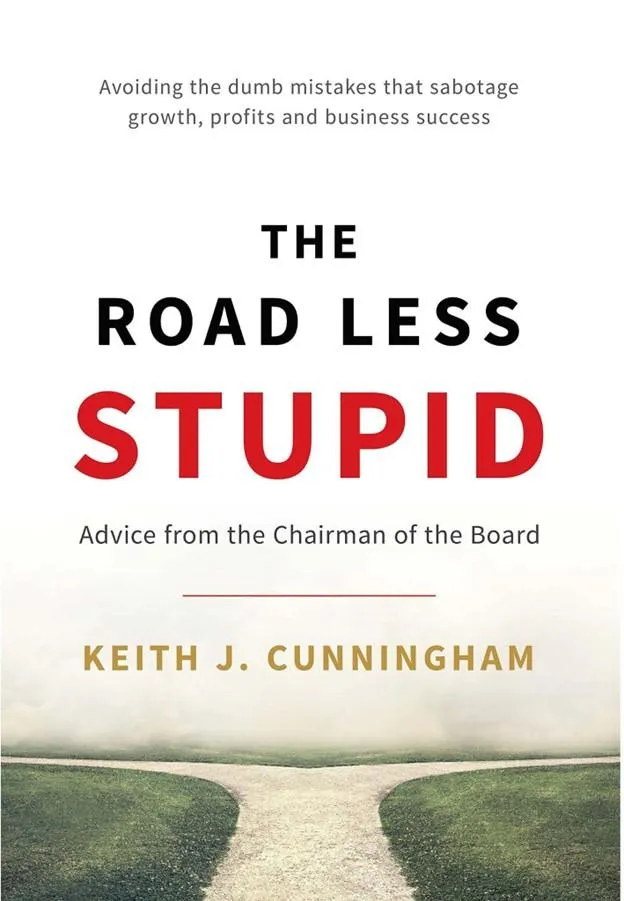
The Road Less Stupid by Keith J. Cunningham

Summary of The Road Less Stupid by Keith J. Cunningham
In The Road Less Stupid, Keith J. Cunningham delivers a powerful, practical guide to business thinking. Rather than romanticizing hustle or innovation, Cunningham zeroes in on what really sinks businesses: bad decisions. He introduces a disciplined practice of “Thinking Time”;a method of pausing to reflect, diagnose, and design before acting. Drawing from decades of experience and painful personal losses, Cunningham teaches how to avoid what he calls the “Dumb Tax”;the cost of poor choices;and instead run a business grounded in clarity, control, and cash flow. This book is less about genius insights and more about rigorous consistency. Here’s what you need to know:
Key Takeaways
● Thinking is a skill;and a discipline.
Successful leaders set aside dedicated time to think deeply about their business problems before acting. Cunningham calls this “Thinking Time,” which involves writing a question at the top of a page and exploring answers thoroughly.
● Avoid the “Dumb Tax.”
Most businesses fail not because of bad luck, but because of bad decisions. The “Dumb Tax” is what we pay when we skip the hard thinking and make impulsive, emotionally driven choices.
● Growth can be dangerous without a solid foundation.
Scaling a broken business model only multiplies its flaws. Focus on creating a business that works before trying to grow it.
● Cash isn’t just king;it’s oxygen.
Businesses don’t go bankrupt because they run out of ideas; they fail because they run out of cash. Knowing your numbers, margins, and cash flow is non-negotiable.
● Operators vs. Owners.
Operators are in the weeds; owners think strategically. Many business owners confuse the two and get stuck working in the business instead of on it.
● Don’t mistake motion for progress.
Just because you’re busy doesn’t mean you’re moving in the right direction. Cunningham warns against the “activity trap” and advocates for outcome-driven decisions.
● Assumptions are hidden landmines.
Businesses often make decisions based on assumptions rather than facts. Thinking Time exposes and challenges those assumptions.
● Revenue ≠ Profit.
Too many business owners chase top-line growth without understanding the costs that come with it. High revenue with low margins leads to disaster.
● Ego is expensive.
One of the most common sources of Dumb Tax is pride. Leaders who can’t admit mistakes or ask tough questions set themselves up for failure.
● Questions are more valuable than answers.
The right question opens doors. Cunningham provides dozens of example questions that can spark breakthroughs in strategy, team-building, and financial planning.
Key Action Items
● Schedule Regular Thinking Time.
Block out 30–60 minutes, 3–5 times a week. Sit with a pen and paper. Write a specific question at the top and brainstorm answers. Don’t rush;think deeply.
● Use Cunningham’s Thinking Time framework:
1. Pick a high-quality question (e.g., “What must be true for this to work?”).
2. Write down all your assumptions.
3. Challenge and reframe those assumptions.
4. Define desired outcomes.
5. List potential strategies and evaluate risks.
● Define your scoreboard.
Know your key metrics. What does success look like in your business? Track it weekly, not monthly or quarterly.
● Implement “Kill Criteria.”
Before starting a project, define what failure looks like and when to pull the plug. This prevents sunk-cost thinking and emotional decision-making.
● Simplify your business model.
Complexity creates confusion. Strip away vanity projects and focus on what actually drives cash flow and customer value.
● Establish clear roles for yourself and your team.
Are you acting as the Owner or Operator today? Delegate operations if your job is to lead and strategize.
● Ruthlessly eliminate low-return activities.
Use the 80/20 rule to focus on the few activities that drive most of your results. Say no to everything else.
● Review financials weekly.
Build fluency in understanding your P&L, balance sheet, and cash flow statement. If you don’t know your numbers, you’re flying blind.
● Avoid shiny object syndrome.
Every opportunity has a cost. If it’s not aligned with your long-term strategy, it’s a distraction.
● Create a “Stop Doing” list.
Not all improvement comes from doing more. Ask: What should I stop doing that is wasting time, money, or energy?
The Road Less Stupid isn’t about clever hacks or motivational fluff. It’s about the brutal, liberating truth that most business failure is preventable;with discipline. Cunningham’s approach is refreshingly honest: the smartest thing you can do is to slow down, ask better questions, think through the consequences, and act with clarity. Success doesn’t come from working harder or faster;it comes from working smarter and avoiding avoidable mistakes.
The book serves as a tactical guide and a mindset reset. If you embrace Thinking Time, question your assumptions, and run your business like an owner;not just an operator;you’ll dramatically reduce your Dumb Tax and build something resilient, profitable, and sustainable.
It’s not the road most traveled, but it is the road less stupid.

